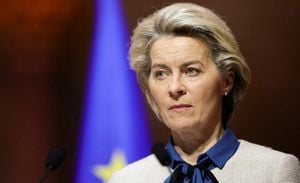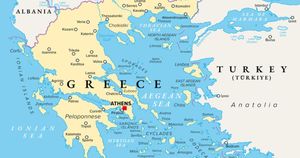The federal Liberal leadership race saw its French-language debate come to life on February 24, 2025, as candidates Mark Carney, Chrystia Freeland, Karina Gould, and Frank Baylis faced off at the event held in Montreal. Moderated by former TVA-Québec anchor Pierre Jobin, the debate opened with discussions centered around pivotal themes impacting Canadians, including the economy, climate action, and international relations.
"I’m the candidate for the future," proclaimed Karina Gould during her opening remarks, aiming for the hearts of voters concerned about progressive leadership amid shifting political tides. The debate went on to capture the candidates' approaches to pressing issues, highlighting their strategies and visions for Canada.
At 8:30 p.m., the contentious discussion turned to the Israel-Palestine conflict. Gould emphasized the need for Canada to play a role in fostering peace and security, advocating for humanitarian aid and proposing the necessity for a two-state solution. Freeland and Carney shared this sentiment but both criticized former U.S. President Donald Trump’s comments related to Palestinians. Baylis added his perspective, insisting on Canada's moral responsibility to formally recognize Palestine as a nation.
"Canada needs to be morally leading on this front," Baylis stated, reinforcing his commitment to humanitarian principles. With tensions from south of the border, Carney addressed Canada-U.S. relations, asserting, "Trump is more aggressive now than he has been in the past," thereby placing emphasis on the need for Canada to fortify its economy to strengthen negotiation positions.
Throughout the evening, key topics like health care, housing, and environmental policy came under scrutiny. Freeland expressed her full support for the government's new high-speed rail initiative, touting its benefits for the economy and housing, as well as the environment. Carney signaled the need for both public and private investment to support such projects. Baylis echoed this support and shared his aspirations for new economic links through infrastructure improvements.
Positioning Canada’s sovereignty as a priority, Gould articulated her plan to address national security challenges posed by U.S. actions. She stated, "Canada needs to have a calm leader who can unite people," stressing the importance of breaking down domestic trade barriers and reinforcing collective federal and provincial efforts against external pressures.
"All Canadians have to be allies with Europe… freedom is on the line," Gould emphasized, tying her international stance to national identity. The conversation shifted to internal matters as candidates discussed crime and housing issues, with Gould asserting the need for legislative revisions to tackle vehicle theft and the root problems perpetuating crime.
The candidates were questioned on their immigration policies, where Gould argued for recalibrated targets to avoid overwhelming Canada’s social services capabilities. Carney controversially suggested implementing caps on immigration, linking it to the housing crisis Canada faces.
Outer layers of the debate atmosphere unfolded with supporters lining the streets as Carney arrived, drawing enthusiastic cheers and chants. This anticipation highlighted the fervor surrounding his candidacy, with many anticipating his role as the presumed front-runner.
Further adding to the drama of the evening were the recent developments surrounding candidate Ruby Dhalla, who had been disqualified from the race over alleged rule violations. Dhalla expressed her disappointment on social media, asserting her commitment to Quebec. Contesting her disqualification, she appealed to the leadership committee, stoking discord within the party.
After the debate, Freeland described the contest as one "inside the family," underlining camaraderie among the candidates, even amid sharp disagreements on policies. "We all agree on one thing: Pierre Poilievre isn't the guy to stand up to Trump," she contended, focusing on unity against perceived external threats.
Looking forward, Carney affirmed his determination to run for office regardless of the outcome of the leadership race—an indication of ambition beyond mere campaign lines. He hinted at scenarios for potentially calling early elections but maintained the complexity involved, favoring strong mandates for governance stability.
The night wrapped with reflections on the candidates' performances illuminating their differences and priorities for Canadians as they push toward the leadership vote, set against the backdrop of the current socio-political environment.



